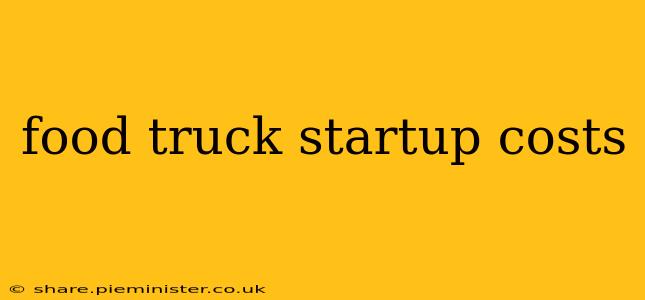Starting a food truck business is an exciting venture, offering flexibility and potentially high rewards. However, understanding the startup costs is crucial for success. This comprehensive guide breaks down the expenses you can expect, helping you create a realistic budget and plan for your culinary journey on wheels.
What are the initial costs involved in starting a food truck business?
This is a multifaceted question, as costs vary significantly based on location, truck type, menu, and desired level of customization. However, we can categorize the expenses into key areas to give you a clearer picture.
1. Purchasing or Renting a Food Truck:
This is often the largest single expense. Prices range dramatically depending on:
- New vs. Used: A new, custom-built truck can cost upwards of $100,000, while a used truck can range from $20,000 to $70,000 or more, depending on its condition and features.
- Size and Features: Larger trucks with more advanced equipment will cost more. Consider your menu and anticipated volume when determining the appropriate size.
- Customization: Adding specialized equipment (like a wood-fired pizza oven or a custom-designed prep area) will significantly increase costs.
2. Food Truck Equipment:
Essential equipment is crucial and significantly impacts your budget. This includes:
- Cooking Equipment: Ranges, ovens, grills, fryers, etc., are fundamental, and their cost depends on fuel type (gas, electric), size, and brand.
- Refrigeration: Commercial-grade refrigerators and freezers are necessary for food safety. The size needed will depend on your menu and storage needs.
- Preparation Equipment: Prep tables, sinks, cutting boards, knives, and other essential tools are indispensable. Look for durable, food-safe materials.
- Point of Sale (POS) System: Efficient order taking and payment processing is vital for smooth operations. Consider options that integrate with delivery apps.
3. Licenses and Permits:
Navigating the legal landscape is essential. Costs vary by location but will include:
- Business License: Required to operate legally in your city or county.
- Food Service Permits: These permits ensure you meet health and safety regulations. They often involve inspections and fees.
- Seller's Permit (Resale Certificate): Necessary to purchase food and supplies wholesale.
- Other Licenses: Depending on your location and menu, you might need additional permits for alcohol sales, mobile vending, or specific food preparation methods.
4. Insurance:
Protecting your business is crucial:
- Liability Insurance: This covers potential claims related to accidents or injuries on your property.
- Commercial Auto Insurance: Required for operating a vehicle for business purposes. This will likely be more expensive than personal auto insurance.
5. Initial Inventory and Supplies:
Before opening your doors, you'll need to stock up:
- Food Ingredients: The cost will depend on your menu and the quality of ingredients you source.
- Packaging and Supplies: Containers, napkins, cutlery, and other disposables will accumulate costs.
- Cleaning Supplies: Maintaining hygiene is paramount; allocate a budget for cleaning products and sanitation equipment.
6. Marketing and Branding:
Establishing your brand and reaching customers is key:
- Branding and Design: Creating a logo, menu, and truck wrap are crucial for brand identity.
- Marketing Materials: Business cards, flyers, and social media marketing will help attract customers.
- Website Development (optional): A website enhances your online presence and can facilitate online ordering.
How much profit can I expect from a food truck?
Profitability greatly depends on several factors, including location, menu pricing, operational efficiency, and marketing effectiveness. While some food trucks generate substantial profits, others struggle to break even. Thorough market research and a well-defined business plan are crucial for predicting profitability.
What are the ongoing costs of running a food truck?
Beyond startup costs, consider ongoing expenses:
- Truck Maintenance and Repairs: Regular maintenance and unexpected repairs are inevitable.
- Fuel Costs: Consider fuel consumption and fluctuating gas prices.
- Food Costs: Ingredient costs can fluctuate, influencing your profitability.
- Staffing Costs (if applicable): Salaries or wages for employees will be a recurring expense.
- Insurance Renewals: Regularly renew your insurance policies to maintain coverage.
- Marketing and Advertising: Ongoing marketing efforts are needed to maintain visibility and attract customers.
How can I reduce my food truck startup costs?
Several strategies can help minimize initial expenses:
- Buy a Used Truck: A significant cost reduction compared to purchasing a new truck.
- Source Equipment Wisely: Look for deals on used but functional equipment.
- DIY Where Possible: If you have the skills, consider handling some tasks (like painting or minor repairs) yourself.
- Start Small: Begin with a streamlined menu and gradually expand as your business grows.
Starting a food truck business requires careful planning and a realistic budget. By thoroughly researching and accounting for these potential costs, you can significantly increase your chances of success in this exciting and dynamic industry. Remember to consult with local authorities and professionals for accurate and up-to-date information specific to your location.
